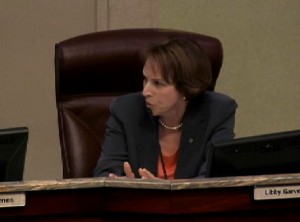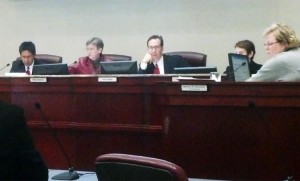 (Updated at 2:35 p.m. on 12/7/12) County Board Member Libby Garvey was recently reelected, having run on a platform of being an independent voice on the Board. True to that promise, today Garvey raised questions about the propriety of another Board member’s business dealings, given a matter currently before the Board.
(Updated at 2:35 p.m. on 12/7/12) County Board Member Libby Garvey was recently reelected, having run on a platform of being an independent voice on the Board. True to that promise, today Garvey raised questions about the propriety of another Board member’s business dealings, given a matter currently before the Board.
Garvey is calling for the Board to delay its scheduled vote on adoption of Virginia’s Public-Private Transportation Act (PPTA). The vote is currently scheduled for Monday, after being deferred at the Nov. 27 Board meeting.
The County Board is considering using a private-public partnership for the design, construction and operation of the planned Crystal City streetcar. The Board would need to adopt the state PPTA in order to enter such a partnership.
Garvey, however, has expressed concerns about the PPTA, maintaining that additional public interest safeguards are needed. She cited “problems with the PPTA procurement for the [Metro] Silver Line,” and a recent report by the Southern Environmental Law Center that found “flaws” in the Virginia PPTA, as reasons why the Board needs “more time to study the implications of adopting the PPTA guidelines and to consider safeguards that will ensure full and open competition and true risk-sharing by the private sector.”
In an email sent to the rest of the Board this morning, Garvey took her concerns a step further, raising questions about whether Board member Chris Zimmerman should be voting on the PPTA, given that he recently disclosed that he’s working as a consultant for AECOM, a large construction, design and transportation conglomerate. AECOM has worked on streetcar and light rail projects in a number of U.S. cities, including Los Angeles, Atlanta, New Orleans, Minneapolis and Grand Rapids.
(A representative from the Minneapolis project spoke at a County Board work session last month about the city’s experience with its public-private partnership.)
In the email, Garvey asked Zimmerman to consider recusing himself from the PPTA vote given the appearance of a conflict of interest.
Dear Colleagues:
I spoke with Chris briefly yesterday afternoon about our possible vote on Monday concerning the PPTA and asked if he would consider delaying and then if he would recuse himself from the vote. At the moment, Chris sees no reason to delay or recuse himself.
So I am writing to all of you because I am very concerned about how this could look to our public and this concerns us all. Chris sent us a letter on October 25, 2012, notifying the Board of his consultant contract with AECOM Canada East. In that letter, Chris stated that “there is the possibility that at a future point it may be necessary for me to disclose my affiliation with the company in matters coming before the Board . . . and to even disqualify myself from participation in those matters.” In the letter, Chris also states that he wants “to be certain to anticipate any potential conflict of interest (or appearance of conflict) that could arise.” I think with the PPTA issue we are at that point and hope Chris will reconsider, and that we all can take a step back here.
Since I am new to the Board, I have only recently become aware of the extensive contractual relationships that have existed between AECOM and Arlington County Government for at least the last few years. With respect to Columbia Pike, AECOM has participated in the Transit Initiative Traffic Report, the peer review of capital cost estimates for the streetcar, the Columbia Pike Land Use and Housing Study and the Columbia Pike Neighborhoods Plan. AECOM also has worked on the Crystal City Multimodal Transportation Study, the Four Mile Run Demonstration Project, and the Crystal City Second Entrance and Access Study. AECOM has several offices in Arlington, briefed us tonight on streetcar vehicles, and was one of the companies to brief us about public private partnerships — the exact issue we will be voting on. I think anyone would assume that it is quite likely they will be doing additional work for the County and, should we adopt the PPTA, they will be submitting an unsolicited bid.
AECOM has been and continues to work on streetcar projects and other transportation projects in the United States, Canada and elsewhere. Its website includes a section on public private partnerships (P3) and states: “AECOM has been involved in at least 90 percent of the Unites States P3 transportation projects.” The company states that P3 projects work well when, among other factors, there is “political support from the top.”
As you well know, the Board had on its November 27th agenda adoption of guidelines for public-private partnerships, pursuant to Virginia’s Public-Private Transportation Act (PPTA). This Act, and our proposed guidelines, would allow a company to present an unsolicited bid to construct and manage major transportation projects, including the streetcar. Given the current economy and limits of federal and state funding, the Board has been receiving information about the possibility of a public-private partnership to fund the streetcar. Last week, I asked that we not act on the proposed guidelines because the PPTA has been flagged as having flaws that (contrary to what we have been told to expect) can allow, and have allowed, the shift of risk from the private to the public sector. These are serious concerns affecting not only our streetcar decision, but also decisions on large projects in the future. We did not have sufficient information to make such a significant decision then. We still do not have sufficient information to act on this, either about necessary safeguards we should implement, nor about Chris’ relationship with AECOM should he continue to decide he need not recuse himself.
A thorough understanding about necessary safeguards aside, in light of Chris’s letter regarding his consultant relationship with AECOM Canada East, I believe that the Board should not act at this time on guidelines that address the selection of contractors on transportation projects and the risks to be borne by the contractor and taxpayers. Chris notes in his letter his desire to anticipate any future conflict of interest or appearance of conflict of interest. I believe we all want that. I also believe there clearly could be an appearance of a conflict with the vote on the PPTA guidelines. I believe we all need to know the facts regarding the County’s contractual and other business relationships with AECOM and all the pertinent details regarding Chris’s consulting relationship with AECOM Canada East. Without these kinds of disclosures, it is not possible to determine the degree to which a conflict of interest, or the appearance of conflict of interest, may exist. As we all know, in the public realm, the appearance of a conflict is as important as the facts. Perceptions are everything.
Finally, I know that we all value the excellent reputation that Arlington has earned for good government and understand that even an appearance of impropriety can tarnish that reputation. That result can easily be avoided in this situation either by waiting to vote on the guidelines until all the facts are disclosed or by Chris deciding not to vote on the PPTA guidelines. Finally, since there are reasons other than those relating to an actual or potential conflict of interest to defer voting on the guidelines, that necessary delay would also allow us the time to obtain and review the facts relating to the conflict issues.
As always, I am happy to discuss this. Libby
Arlington County Attorney Stephen MacIsaac tells ARLnow.com he doesn’t see any reason Zimmerman would need to recuse himself. He pointed out that the vote pertains to adopting guidelines, not awarding a contract. Because no contract is being awarded and there’s no financial benefit to Zimmerman, he says there’s no conflict of interest.
“My advice to Zimmerman is he doesn’t have a conflict and he doesn’t need to recuse himself. I think all five Board members are eligible to vote on this,” said MacIsaac. “There’s certainly no reason for Zimmerman to recuse himself.”
MacIsaac adds that Zimmerman didn’t immediately have to inform his fellow Board members of his work as an AECOM consultant, but he appears to have done so to allow for transparency.
“He could have just kept it to himself and not said a word and worked out the conflicts when and if one arises,” said MacIsaac.
MacIsaac noted that there may be conflicts related to Zimmerman’s consulting in the future, but they will be dealt with should they arise. He stresses that currently no issue has been found.
“I think it’s unfortunate the Conflicts Act would be raised under these circumstances,” MacIsaac said. “It just doesn’t seem fair.”
MacIsaac sent a memo to the Board yesterday (Thursday) explaining his view. An excerpt from the memo reads:
“The claim of impropriety appears to be based on a projection into the future about what an entity related to the AE Com subsidiary with which Mr. Zimmerman has an employment relationship might do in the future. Such speculative forecasting about potential conflicts in the future creates a standard few elective officials can meet, because it is not grounded in actual facts. It suggests a rule that would prohibit Board members from participating in transactions coming before the Board because their personal interests or those of their family members might one day in the future intersect with County business.”
 Arlington County Board member Libby Garvey, an outspoken opponent of the planned Columbia Pike streetcar system, called for a truce yesterday on the language surrounding the bus alternative.
Arlington County Board member Libby Garvey, an outspoken opponent of the planned Columbia Pike streetcar system, called for a truce yesterday on the language surrounding the bus alternative.












